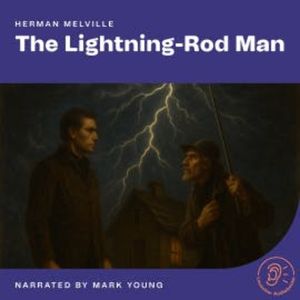A man sits at his hearth as thunder shakes the mountains. Then—a knock. A stranger steps in, soaked and shivering, armed not with warmth or need, but with polished copper and an urgent offer. He doesn't sell comfort. He sells protection—against the very sky.
The Lightning-Rod Man is Herman Melville at his most compact and cunning. This sharply drawn tale uses one room, one storm, and two voices to stage a quiet war between reason and fear, independence and submission, belief and the glittering promise of safety. It's a sales pitch wrapped in a sermon, disguised as a fable.
Melville's dry wit and subtle irony crackle beneath the thunder. The visitor's obsession with bolts and conductors, with calculated distances and copper rods, is more than technical fuss—it's a worldview, a business model, a quiet tyranny cloaked in science. The narrator's resistance is equally symbolic: a choice to remain unshielded, to risk being struck, rather than surrender to fear disguised as logic.
Short, strange, and simmering with tension, this story feels oddly modern. It speaks to every moment we're asked to buy into anxiety, to protect ourselves from what might happen, if only we pay the right price. Whether you read it as allegory, satire, or subtle horror, The Lightning-Rod Man still hums with electric relevance.
The Lightning-Rod Man
- Sprecher
- Dauer
- 19 Minuten
- Verlag
- Typ
- Ungekürzt
- Format
- Hörbuch Download
- ISBN
- 4069828338425
- Sprache
- Englisch
- Kategorie
Vollversion anhören
Inbegriffen in der Streaming Flatrate
Enthalten im Audioteka Club Abo
- Dieser und weitere 75.000 Titel enthalten in der Streaming Flatrate
- Exklusiver Abonnent*innen Preis für Titel, die nicht im Streaming verfügbar sind
- Keine Stundenlimits innerhalb der Flatrate
- Deutsche und internationale Bestseller gelesen von den besten deutschen Stimmen
0,99 €
Preis außerhalb des Clubs
Beschreibung
Bewertungen und Rezensionen
Nur angemeldete Nutzer können Bewertungen abgeben. Jetzt anmelden
Die Meinungen stammen von angemeldeten Kunden, die unser Produkt oder unsere Dienstleistung gekauft haben. Die Meinungen werden in Übereinstimmung mit den Bewertungsrichtlinien gesammelt, überprüft und veröffentlicht.
Vollversion anhören
Inbegriffen in der Streaming Flatrate
Enthalten im Audioteka Club Abo
- Dieser und weitere 75.000 Titel enthalten in der Streaming Flatrate
- Exklusiver Abonnent*innen Preis für Titel, die nicht im Streaming verfügbar sind
- Keine Stundenlimits innerhalb der Flatrate
- Deutsche und internationale Bestseller gelesen von den besten deutschen Stimmen
0,99 €
Preis außerhalb des Clubs
